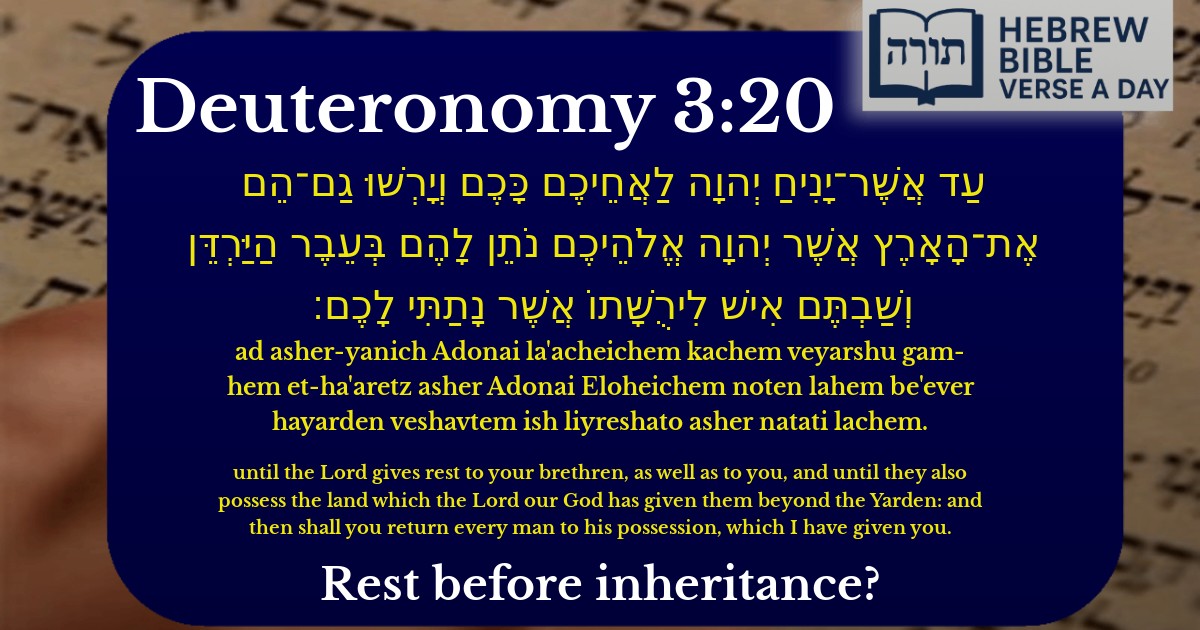Join Our Newsletter To Be Informed When New Videos Are Posted
Join the thousands of fellow Studends who rely on our videos to learn how to read the bible in Hebrew for free!
Hebrew Text
עַד אֲשֶׁר־יָנִיחַ יְהוָה לַאֲחֵיכֶם כָּכֶם וְיָרְשׁוּ גַם־הֵם אֶת־הָאָרֶץ אֲשֶׁר יְהוָה אֱלֹהֵיכֶם נֹתֵן לָהֶם בְּעֵבֶר הַיַּרְדֵּן וְשַׁבְתֶּם אִישׁ לִירֻשָּׁתוֹ אֲשֶׁר נָתַתִּי לָכֶם׃
English Translation
until the Lord gives rest to your brethren, as well as to you, and until they also possess the land which the Lord our God has given them beyond the Yarden: and then shall you return every man to his possession, which I have given you.
Transliteration
Ad asher-yanich Adonai la'acheichem kachem veyarshu gam-hem et-ha'aretz asher Adonai Eloheichem noten lahem be'ever hayarden veshavtem ish liyreshato asher natati lachem.
Hebrew Leining Text
עַ֠ד אֲשֶׁר־יָנִ֨יחַ יְהֹוָ֥ה <small>׀</small> לַֽאֲחֵיכֶם֮ כָּכֶם֒ וְיָרְשׁ֣וּ גַם־הֵ֔ם אֶת־הָאָ֕רֶץ אֲשֶׁ֨ר יְהֹוָ֧ה אֱלֹהֵיכֶ֛ם נֹתֵ֥ן לָהֶ֖ם בְּעֵ֣בֶר הַיַּרְדֵּ֑ן וְשַׁבְתֶּ֗ם אִ֚ישׁ לִֽירֻשָּׁת֔וֹ אֲשֶׁ֥ר נָתַ֖תִּי לָכֶֽם׃
עַ֠ד אֲשֶׁר־יָנִ֨יחַ יְהֹוָ֥ה ׀ לַֽאֲחֵיכֶם֮ כָּכֶם֒ וְיָרְשׁ֣וּ גַם־הֵ֔ם אֶת־הָאָ֕רֶץ אֲשֶׁ֨ר יְהֹוָ֧ה אֱלֹהֵיכֶ֛ם נֹתֵ֥ן לָהֶ֖ם בְּעֵ֣בֶר הַיַּרְדֵּ֑ן וְשַׁבְתֶּ֗ם אִ֚ישׁ לִֽירֻשָּׁת֔וֹ אֲשֶׁ֥ר נָתַ֖תִּי לָכֶֽם׃
🎵 Listen to leining
Parasha Commentary
📚 Talmud Citations
This verse is not quoted in the Talmud.


Context of the Verse
This verse (Devarim 3:20) is part of Moshe Rabbeinu's address to the tribes of Reuven and Gad, who requested to settle on the eastern side of the Yarden (Jordan River) due to its suitability for their livestock. Moshe agreed on the condition that they first assist the other tribes in conquering Eretz Yisrael before returning to their allotted portion.
Key Themes and Interpretations
Halachic and Ethical Implications
The Talmud (Bava Metzia 83a) derives from this verse that one must not prioritize personal comfort over communal needs. The Rambam (Hilchot Melachim 6:7) applies this principle to wartime, ruling that soldiers may not abandon their posts until victory is secured for all.
Midrashic Insights
The Midrash Tanchuma (Bamidbar 7) connects this verse to the broader theme of unity, comparing the tribes to limbs of a single body. Just as one limb cannot rest while another is in pain, so too must Bnei Yisrael support one another in achieving their shared destiny.